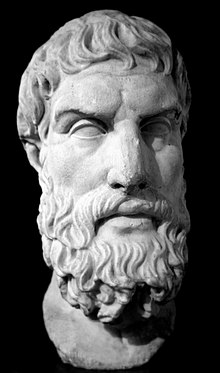Principle of Multiple Explanations
| Epicurus | |
|---|---|

Roman marble bust of Epicurus
|
|
| Born | February 341 BC Samos |
| Died | 270 BC Athens |
| Era | Ancient philosophy |
| Region | Western philosophy |
| School | Epicureanism, atomism, materialism, hedonism |
|
Main interests
|
Physics, ethics, epistemology |
|
Notable ideas
|
Pleasure principle, the "moving"/"static" pleasures distinction, ataraxia, aponia, atomic swerve |
|
Influences
|
|
Epicurus (/ˌɛpɪˈkjʊərəs, ˌɛpɪˈkjɔːrəs/;Greek: Ἐπίκουρος, Epíkouros, "ally, comrade"; 341–270 BC) was an ancient Greek philosopher who founded a school of philosophy now called Epicureanism. Only a few fragments and letters of Epicurus's 300 written works remain. Much of what is known about Epicurean philosophy derives from later followers and commentators.
For Epicurus, the purpose of philosophy was to attain the happy, tranquil life, characterized by ataraxia—peace and freedom from fear—and aponia—the absence of pain—and by living a self-sufficient life surrounded by friends. He taught that the root of all human neurosis was death denial, and the tendency for human beings to assume that death will be horrific and painful, which he claimed causes unnecessary anxiety, selfish self-protective behaviors, and hypocrisy. According to Epicurus, death is the end of both the body and the soul and therefore should not be feared. He also taught that the gods neither reward nor punish humans; that the universe is infinite and eternal; and that occurrences in the natural world are ultimately the result of atoms moving and interacting in empty space.
His parents, Neocles and Chaerestrate, both Athenian-born, and his father a citizen, had emigrated to the Athenian settlement on the Aegean island of Samos about ten years before Epicurus's birth in February 341 BC. As a boy, he studied philosophy for four years under the Platonist teacher Pamphilus. At the age of eighteen, he went to Athens for his two-year term of military service. The playwright Menander served in the same age-class of the ephebes as Epicurus.
...
Wikipedia
